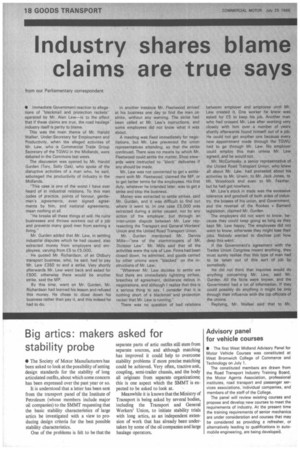Industry shares blame claims are true says
Page 20

If you've noticed an error in this article please click here to report it so we can fix it.
from our Parliamentary correspondent • Immediate Government reaction to allegations of "blackmail and protection rackets" operated by Mr. Alan Law—is to the effect that if these claims are true, the road haulage' industry itself is partly to blame.
This was the main theme of Mr. Harold Walker, Under-Secretary for Employment and Productivity, when the alleged activities of Mr. Law, who is Commercial Trade Group Secretary of the TGWU in the Midlands, were debated in the Commons last week.
The discussion was opened by Mr. Harold Gurden (Tory, SeIly Oak), who spoke of the disruptive activities of a man who, he said, sabotaged the productivity of industry in the Midlands.
"This case is one of the worst I have ever heard of in industrial relations. To this man codes of practice, points of honour, gentlemen's agreements, oven signed agreements by him, and national agreements, mean nothing at all.
"He breaks all these things at will. He ruins businesses and throws workers out of a job and prevents many good men from earning a living," Mr. Gurden added that Mr. Law, in settling industrial disputes which he had caused, also extracted money from employers and employees, varying from £5 to £5,000, . He quoted Mr. Richardson, of an Oldbury transport business, who, he said, had to pay Mr. Law £350 to end a strike. Very shortly afterwards Mr. Law went back and asked for £500, otherwise there would be anotner strike, said the MP.
By this time, went on Mr. Gurden, Mr. Richardson had learned his lesson and refused this money. He chose to close down his business rather than pay it, and this indeed he had to do. In another instance Mr. Fleetwood arrived at his business one day to find the men on strike, without any warning. The strike had been called at Mr. Law's instructions, and some employees did not know what it was about.
A meeting was fixed immediately for negotiations, but Mr. Law prevented the union representatives attending, so that the strike continued. There was no means by which Mr. Fleetwood could settle the matter. Shop stewards were instructed to "blackdeliveries if any should be made.
Mr. Law was not concerned to get a settlement with Mr. Fleetwood, claimed the MP, or to get better terms for the employees. His first duty, whatever he intended later, was to get a strike and stop the business.
Money was extracted to settle strikes, said Mr. Gurden, and it was difficult to find out where it went to. In one case £5,000 was extracted during a strike caused, not by any action of the employer, but through an inter-union dispute between Mr. Law representing the Transport and General Workers' Union and the United Road Transport Union, Mr. Gurden mentioned Mr. Dennis Mills—"one of the storrntroopers of Mr. Dictator Law". Mr. Mills said that all the activities were the rule of Law. Firms had been closed down, he admitted, and goods carried by other unions were "blacked" on the instructions of Mr. Law.
"Wherever Mr. Law decides to settle we find there are immediately lightning strikes, breaches of agreement, deliberate delays in negotiations, and although I realize that this is a serious thing to say. I consider that it is nothing short of a blackmail and protection racket that Mr. Law is running."
There was no question of bad relations between employer and employee until Mr. Law created it One worker he knew was asked for £5 to keep his job. Another man who had crossed Mr. Law after working very closely with him over a number of years shortly afterwards found himself out of a job. He could not get another one because every new appointment made through the TGWU had to go through Mr. Law. No employer could employ this man unless Mr. Law agreed, and he would not Mr. McCumesky, a senior representative of the United Road Transport Union, who knew all about Mr. Law, had protested about his activities to Mr. Urwin, to Mr. Jack Jones, to Mr. Woodcock and even to Mr. Feather, but he had got nowhere.
Mr. Law's stock in trade was the excessive tolerance and goodwill of both sides of industry, the bosses of his union, and Government, and the reversal of the Rookes v Barnard legislation, claimed Mr. Gurden.
The employers did not want to know, because they could keep going as long as they kept Mr. Law happy, The employees did not want to know, otherwise they might lose their jobs. Nobody wanted to disclose just how deep this went.
If the Government's agreement with the Trades Union Congress meant anything, they must surely realise that this type of man had to be taken out of this sort of job by somebody.
He did not think that inquiries would do anything concerning Mr. Law, said Mr. Gurden. All the facts were known, and the Government had a lot of information. If they could possibly do anything it might be only through their influence with the top officials of the unions.
Replying, Mr. Walker said that to Mr.
















































































































